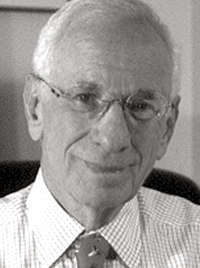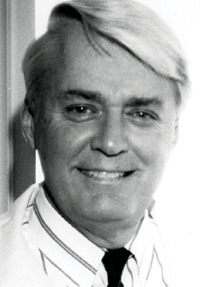Bluestone, Finn, de Groat, Matthews Are Named Distinguished Professors
The University of Pittsburgh has honored four of its School of Medicine faculty members as Distinguished Professors, the highest honor that can be accorded a member of the professoriate. They are Charles D. Bluestone, the Eberly Professor of Pediatric Otolaryngology; Olivera J. Finn, a professor and chair in the Department of Immunology, professor of surgery, and coleader of the University of Pittsburgh Cancer Immunology Program; William C. de Groat, a professor of pharmacology and chemical biology; and Karen A. Matthews, a professor of psychiatry, epidemiology, and psychology.
The rank of Distinguished Professor recognizes extraordinary, internationally recognized scholarly attainment in an individual discipline or field. Pitt Chancellor Mark A. Nordenberg made the appointments—which will become effective July 1—based on the recommendations of Pitt Provost and Senior Vice Chancellor James V. Maher.
Biographical information on the faculty honorees follows.
 Charles D. Bluestone
Charles D. BluestoneBluestone (A&S ’54, MED ’58), who was named a Distinguished Professor of Otolaryngology, has devoted more than 30 years to treating children with ear, nose, and throat problems. He became the School of Medicine’s first Eberly Professor of Pediatric Otolaryngology in 1996 and is the former director of the Division of Pediatric Otolaryngology in Children’s Hospital of Pittsburgh (CHP) of UPMC.
His research interests include otitis media—a middle ear disease that is the most common infection among children in the United States after the common cold—as well as Eustachian tube function and pediatric tonsillectomy and adenoidectomy. After serving two years in the U.S. Air Force, Bluestone returned to Pittsburgh in 1964 and entered private practice. At that time, he was a clinical professor of otolaryngology in Pitt’s School of Medicine and chief of the otolaryngology service at CHP.
In 1972, he left private practice and became the first full-time director of the Department of Otolaryngology in Boston City Hospital, which in 1996 became part of Boston Medical Center. While in Boston, he was a faculty member at Boston, Harvard, and Tufts universities.
In 1975, Bluestone returned to Pittsburgh to become the first full-time director of the Department of Pediatric Otolaryngology at CHP and a professor of otolaryngology in Pitt’s School of Medicine. That year, he and his associate, the late Sylvan E. Stool, initiated a fellowship in pediatric otolaryngology at CHP and Pitt. The two-year fellowship was the first subspecialty in pediatric otolaryngology to receive accreditation.
In 1980, he founded the National Institutes of Health-funded Pittsburgh Otitis Media Research Center at CHP and Pitt, where researchers investigate medical and surgical treatments for otitis media and conduct clinical studies related to the disease.
In 2004, he stepped down from his position as department director, retaining a clinical schedule and his teaching and research activities.
Bluestone has authored or coauthored more than 500 publications primarily related to pediatric otolaryngology, of which almost half were published in peer-reviewed journals. He is currently on the editorial board of the International Journal of Pediatric Otolaryngology.
Among his many awards is the 2003 Distinguished Service Award that Bluestone received from the American Academy of Otolaryngology-Head and Neck Surgery. Bluestone received both his Bachelor of Science, magna cum laude, and his medical degree from Pitt. He was elected to Alpha Omega Alpha, a national honor society for medical students.
 Olivera J. Finn
Olivera J. FinnOlivera “Olja” Finn, who was named a Distinguished Professor of Immunology, is chair of the Department of Immunology.
An expert in cancer immunology, Finn has worked to develop vaccines that boost the immune system’s ability to recognize and destroy tumor cells, an approach that holds promise for not only treating cancer, but also preventing its inception or its recurrence. Her efforts have focused on pancreatic and colorectal cancer prevention vaccines.
Recently, she and her colleagues began testing a vaccine that, if effective, might prevent patients at high risk for colorectal cancer from developing precancerous polyps and spare them the inconvenience of repeated colonoscopies. The vaccine is directed against an abnormal variant of a self-made cell protein called MUC1, which is produced in excess by adenomas—polyps that could become cancerous. This new vaccine stimulates an immune response against the MUC1 protein, leading the patient’s immune system to attack and destroy abnormal cells.
Born and raised in the former Yugoslavia, Finn married an American exchange student shortly after graduating from high school and moved to the U.S. She earned her undergraduate degree in biology at Interamerican University in San Juan, Puerto Rico, and her PhD in medical microbiology and immunology at Stanford University.
Finn made a groundbreaking discovery 20 years ago, when she identified the first cancer antigen—a tumor molecule that prompts a reaction from immune cells. Finn is the most recent past president of the American Association of Immunologists.
 William C. de Groat
William C. de GroatDe Groat, who was named a Distinguished Professor of Pharmacology and Chemical Biology, is internationally known for his work on urinary dysfunction and pain after spinal cord injury. His main interest is in the neural control of the lower urinary tract and the mechanisms that affect incontinence and painful bladder conditions. De Groat has made a number of influential discoveries that illuminate how the nervous system controls urinary function. He also has fathered the study of bladder dysfunction following spinal injury, shedding light not only on the causes of bladder problems, but also their possible treatment and remedies.
At Pitt, de Groat has been the recipient of both the Chancellor’s Distinguished Research Award and the Chancellor’s Distinguished Teaching Award. He is known for using a “problem-solving approach” to teaching that incorporates historical context, research, and personal experiences, and allows students to explore the link between basic and clinical science.
In addition, de Groat received the 2007 Reeve-Irvine Research Medal for his lab’s studies of the mechanisms underlying recovery of autonomic nervous system function following spinal cord injury. The award, named for the late Christopher Reeve, is given annually by the University of California at Irvine’s Reeve-Irvine Research Center and Joan Irvine Smith and the Athalie R. Clark Foundation for highly meritorious scientific contributions in the area of spinal cord injury and repair.
Educated at the University of Pennsylvania School of Medicine, de Groat received postdoctoral training in pharmacology at the University of Pennsylvania and in neurophysiology at the John Curtin School for Medical Research in Canberra, Australia. He joined the Pitt faculty in 1968 and has been a visiting scientist at the National Institutes of Health and the University College London.
 Karen A. Matthews
Karen A. MatthewsMatthews, who was named a Distinguished Professor of Psychiatry, is also a Pitt professor of psychology in Pitt’s School of Medicine and a professor of epidemiology in the Graduate School of Public Health. She has been a member of Pitt’s faculty since 1979.
Matthews is currently the director of the School of Medicine’s Cardiovascular Behavioral Medicine Research Program and director of the Pittsburgh Mind-Body Research Center, which is jointly operated by Pitt and Carnegie Mellon University.
Matthews earned her PhD in psychology at the University of Texas in Austin at a time when most psychologists studied determinants and treatment of mental health and illness. Through her research and educational training programs, she participated in developing the psychology of physical illness as a specialty area. Her research has focused on behavioral risk factors for cardiovascular disease and their determinants at key developmental transitions. She is currently conducting research on the influence of menopause on women’s health, development of behavioral risk factors in adolescence and young adulthood, the role of stress-induced physiological responses in the etiology of heart disease and hypertension, sleep quality as a possible risk factor for cardiovascular disease, and the pathways connecting sociodemographic factors and poor health.
Matthews is a member of the Institute of Medicine and the Network on Socioeconomic Status and Health of the John D. and Catherine T. MacArthur Foundation. She previously served as editor-in-chief of the journal Health Psychology and as president of both the American Psychosomatic Society and the Health Psychology Division of the American Psychological Association (APA). She has received numerous awards, including the 2005 APA Award for Distinguished Scientific Applications of Psychology. In addition, her research has been recognized by the American Heart Association, APA Health Psychology and Pediatric Psychology divisions, Society of Behavioral Medicine, North American Menopause Society, and the American Psychosomatic Society. She was awarded the Philosophiae Doctor Honoris Causa from the University of Helsinki in 2007.
Other Stories From This Issue
On the Freedom Road

Follow a group of Pitt students on the Returning to the Roots of Civil Rights bus tour, a nine-day, 2,300-mile journey crisscrossing five states.
Day 1: The Awakening
Day 2: Deep Impressions
Day 3: Music, Montgomery, and More
Day 4: Looking Back, Looking Forward
Day 5: Learning to Remember
Day 6: The Mountaintop
Day 7: Slavery and Beyond
Day 8: Lessons to Bring Home
Day 9: Final Lessons

